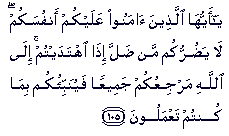Our Conduct, Extended Family, Differing Opinions
Issue 303 » December 3, 2004 - Shawwal 20, 1425
General
| Living the Quran |
Al-Maida
(The Table)
What is stressed here is that rather than occupying himself unduly with examining faults in the belief and conduct of others, a man should pay greater attention to a critical examination of his own conduct. His primary concern should be with his own faith and conduct. If a man is himself obedient to God, observes his duties to Him and to His creatures including his duty to promote what is good and forbid what is evil, and lives according to the dictates of righteousness and honesty, he has fulfilled his obligation and if others persist either in false beliefs or in moral corruption their errors cannot harm him. This verse in no way means that a man should care only for his own salvation and should remain unconcerned with the reform of others. Abu Bakr removed this misconception in one of his sermons when he remarked: 'You recite this verse but interpret it erroneously. I have heard the Messenger of Allah (peace be upon him) say that when people see corruption but do not try to change it; and when they see a wrong-doer commit wrong but do not prevent him from doing so, it is not unlikely that God's chastisement will seize them all. By God, it is incumbent upon you that you bid what is good and forbid what is evil or else God will grant domination upon you to those who are the worst among you. They will greatly chastise you and then when your righteous ones pray to God, their prayers will not be answered.' Source: |
| Understanding the Prophet's Life |
| Extended Family System in Islam In Islam, the family is the cornerstone of the society. Therefore, Islam gives special attention to its solidarity and strength in pursuit of establishing a well-prepared society that can face all challenges of life. What is important in Islam is for the children to take the responsibility of caring for the parents especially when they are in advance age and when they are unable to take care of themselves. This is an obligatory duty on children. However, this duty does not necessarily imply that the children have to live together all in the same apartment so long as the children fulfill their responsibilities by living in close proximity even though they aren’t in the same house or apartment. By doing so, they would have fulfilled their religious duty. It is not encouraged that all the grown up children, married or unmarried, live together in the same house because of the fact it may give rise to jealousy and suspicion when some of them are living with their wives on daily contact with men (in-laws). The Prophet (peace and blessings be upon him) said: “The in-laws are death.” This is a serious warning from the Prophet (peace and blessings be upon him), against creating circumstances for in-laws to be in privacy in the same house. Our duty towards our parents and brothers and sisters can be fulfilled while living in the proximity of one another in separated apartments or independent living quarters. It is well-known from the practice of the Prophet (peace and blessings be upon him) that he did not live with his extended family and wives in a single apartment. The Prophet, peace and blessings be upon him, fulfilled his duties towards all of them while visiting them frequently and maintaining his obligations towards them. Source: |
| Blindspot |
Which Opinion is Right? There are many fiqh (Islamic jurisprudence) issues regarding which the Islamic scholars are in disagreement. Following is the correct method for making a personal decision regarding these issues:
When faced with the need to make a decision regarding one or more of these issues, it is not right to always take the easy way out no matter what nor is it right to choose one or more of our friends, family members, etc. and to blindly follow whatever they are doing. Furthermore, it is not right to try to force others to follow what seems correct to us and to claim that whoever does not follow the particular opinion that seems most correct to us is 'wrong' nor is it right to cut off ties with our Muslim brothers and sisters due to this. Of course, the above method will lead to different people taking different actions but that is only to be expected since even the Islamic scholars, with their knowledge and the time that they have spent on understanding the teachings of Islam, have not been able to come to a single decision. Even the companions of the Prophet disagreed on various fiqh issues but, although they frequently tried to convince each other of the correctness of their opinion, they were still united and they did not make these disagreements an excuse for holding grudges in their hearts for each other nor did they make these disagreements an excuse for cutting off ties with each other or treating each other like enemies. If the above method is followed, everyone is doing the right thing even if the actual decision made differs from individual to individual. Source: |
